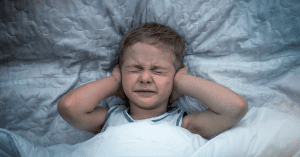It was one sweltering evening while we were visiting my dad in Vermont (yup it can get sweltering there). Both kids had skipped their naps and were exhausted. My youngest woke up a few hours after falling asleep with blood curdling screams and tears running down his face. He sat right up and stared right into my eyes. I was just terrified. It seemed like anything I did made his screaming and crying worse. The screaming felt like it lasted an eternity. I started crying and I had no idea how to help my child calm down and get back to sleep. It wasn’t until I actually thought about it the next day that I realized we actually experienced a night terror.
Has your little one ever had a night terror? In the moment, they can be very scary for parents and caregivers, as your child is screaming bloody murder and you have no idea why. Luckily, night terrors tend to be relatively benign and our little ones tend to not be too affected by them, and don’t even remember that they have happened.
 So why do night terrors happen and when should we be worried about them happening?
So why do night terrors happen and when should we be worried about them happening?
What are night terrors?
Night terrors occur during the transition from deep sleep into REM sleep, often during the first few hours of the night’s sleep. Since they occur in deep sleep and no mental images are produced, children do not recall night terrors.
Night terrors are relatively rare, occurring in 3-6% of children, typically between the ages of 4 and 12 years (although can happen at younger ages as well). Some signs of a night terror include sitting upright in bed, shouting or screaming, thrashing, sweating, and increased heart and respiratory rates. Often the child will settle after a couple of minutes and go back to sleep.
Typical causes of night terrors
Night terrors are triggered by an over reaction of the central nervous system and often occur in children who are overtired, ill, sleeping in a new place, on a new medication, or consuming caffeine. Fevers and excessively hot sleep spaces (like in our case) can also trigger them.
How should you deal with a night terror?
Although night terrors can be scary for parents and caregivers, the best thing to do is just wait it out. Waking the child might cause them to become disoriented or more upset. The best thing to do is try to prevent them by making sure your kids are getting enough sleep and reducing stress.
When should I be worried about a night terror?
Night terrors are pretty benign, but if you start to experience them, you may want to bring them up at your next well visit with your pediatrician. If they seem to be occurring frequently, then it would be worth giving your pediatrician a quick call (or email) and let them know what’s going on. It’s definitely something you don’t want your kids to be losing sleep over and you want to make sure that there are no underlying conditions that are causing them to happen.










